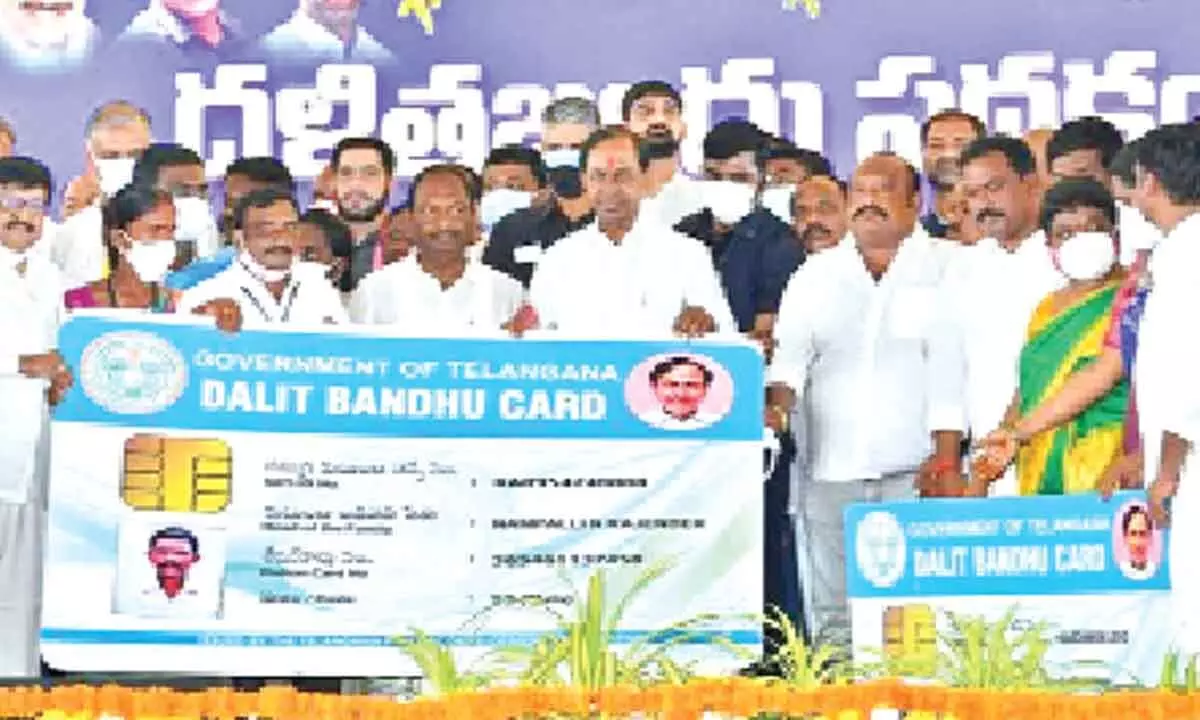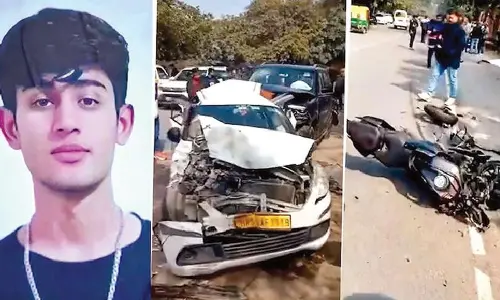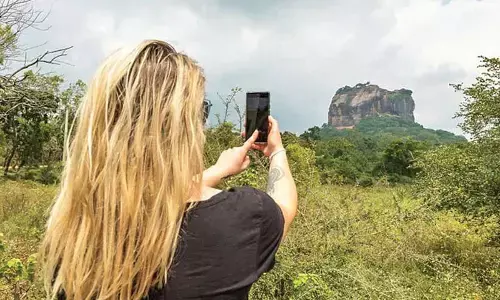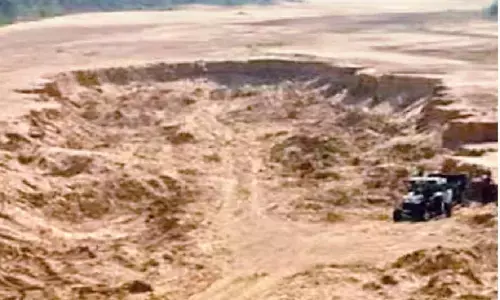Year 2022: Dalit Bandhu on a massive scale-up

The scheme heralded a new chapter in the history in Telangana and the concept is spreading like a wild fire in the country
The comprehensive Household Survey conducted in Telangana seven-and-a-half years ago revealed that there were 1.82 million families belonging to the Scheduled Castes, accounting for 17.53% of the total families. The Dalit population in the state might have gone up substantially since then. At least nine out of 33 districts in the state have more than 20% SC population now. Despite 75 years of Independence, there has not been significant improvement for the uplift of Dalits and their condition under the successive governments both at Center and in the united Andhra Pradesh. The flagship programme, Dalit Bandhu, conceived and being implemented successfully in Telangana is the first of its kind scheme for the empowerment of Dalits in the country.
Autonomy, self-determination and confidence in individuals and societies, who are vulnerable are possible only when they are adequately and systematically empowered. This would also enable them to represent their interests effectively in a responsible way and acting on their own authority. Livelihoods of Dalits who are probably more vulnerable than any other community will be enhanced through effective participation of people and communities in the management of their own social, economic and environmental objectives through empowering.
In this context, Chief Minister K Chandrashekar Rao conceptualised the Dalit Empowerment Policy at a meeting of Dalit leaders cutting across the party lines in the last week of June 2021. Prior to this, CM KCR did a lot of brain storming with his officials, intellectuals, writers and activists from the Dalit Community before making an elaborate policy of Dalit Bandhu.
The all-party meeting duly endorsed then that the proposed CM Dalit Empowerment Programme would bring in a qualitative change in the lives of Dalits and would become a role model for the country. In fact, CM KCR's endeavour has been to bring in a qualitative change in the lives of all sections of people in the State and his commitment to strengthen the rural economy has no parallel. Dalit Bandhu is not just a mere government's welfare program but also a massive people's movement aimed at empowering each Dalit family financially and perhaps can be compared to the Telangana statehood agitation.
The CM then also made it very clear that under the Dalit Empowerment Programme, Dalit families would be developed in a phased manner and this is in addition to SC Sub Plan. Decision to deposit the Rs 10 lakh financial assistance without any bank guarantee directly into the bank accounts of the Dalit beneficiaries was also taken at the all-party meeting. Initially in the piloting phase it was planned to benefit 100 families from each of the 119 constituencies all over the state.
Later, before scaling of the program across the State, in all the Assembly Constituencies, in order to understand the modalities and develop further guidelines, it was decided to implement in Huzurabad Assembly Constituency, as a Pilot on saturation mode. However, Chief Minister K Chandrashekar Rao sprang a surprise on August 4, 2021, by launching Dalit Bandhu at his adopted village of Vasaalamarri in Turkapalli mandal of Yadadri-Bhongir District. KCR declared in a meeting in the village that Dalit Bandhu had been launched.
Subsequently, it was decided to implement the Dalit Bandhu in the four mandals namely, Chintakani in Khammam District, Thirumalagiri in Suryapet District, Charagonda in Nagar Kurnool District and Nizam Sagar in Kamareddy District again on saturation mode. Consequently, more and more beneficiaries were added extending the area of implementation and numbers of beneficiaries. Thus, the programme is being taken up across the state in a target mode, in a phased manner, and as a beginning, it is being implemented in all the Assembly Constituencies of the state, at the rate of 100 families per constituency, in the financial year 2021-22. Centre for Dalit Studies was roped in to share its plans for the welfare and development of Dalits.
The Dalit Bandhu scheme heralded a sea change in the lives of Dalits and has become torchbearer for Dalits elsewhere in the country. An old adage says 'Give a man a fish, and you feed him for a day. Teach a man to fish, and you feed him for a lifetime'. This is what exactly CM KCR is doing. He is giving the DBT cash required for the Dalit families to start a business on their own so that they can become traders, businessmen, service sector operators etc. This will make them self-reliant economically and live with dignity and self-respect.
This is thus, yet another innovative and extraordinary initiative to empower Dalits living all over the state to live with dignity, self-respect and to become self-sufficient economically forever. Needless to say, that it is paying rich dividends to the Dalit Community now, after a year and half and it received Nationwide Appreciation. The Rs 10 lakh that would be deposited directly into the accounts of Dalit families will serve as capital to start a business with the end goal of economic empowerment of the entire SC community. The scheme triggered a ripple effect having a direct impact on the entire rural economy by signaling spending in other sectors.
Telangana Dalit Bandhu scheme would help Dalits to define their own development and become partners in the development. The Scheme has three factors namely, monitoring the implementation of the scheme, evaluating the results and creating a security fund. The last is named as 'Dalit Bandhu Rakshana Nidhi' for protection and safety of Dalits as a supportive mechanism, which is set up permanently with the government and beneficiary participation. A sum of Rs 10,000 would be kept aside from the Rs 10 lakh assistance under the scheme and Government would add matching amount of Rs 10000. A separate SB account shall be maintained for this Rakshana Nidhi.
Under Dalit Bandhu scheme Dalits are setting up their choice of business such as power tiller, harvester, Paddy planting machine, Autos, tractors, Poultry, tent house, Diary industry, Oil Mill, grinding mill, cement and bricks business, industry, hotel, Steel, cement and building material shops, photography, videography, mobile phone shops, Mobile tiffin Centers, Hotels, Cloth emporium, furniture shops etc. To track, monitor and supervise implementation of the scheme, technology is put to its best use like issue of identity cards to the beneficiaries which will have an electronic chip inserted for every beneficiary. Through a Bar Code, the transactions are being monitored.
The uniqueness of the scheme is that it directly grants financial assistance to the Dalit families not to fulfil their immediate needs but to start their own economic activity which will make them financially self-sufficient forever. It helps them to stand on their own and attain growth financially without depending on any government or financial institution.
The government released Rs 3,849.35 crores during the financial year 2021-22 and made provision of Rs 17,700.00 crores in the financial year 2022-23 for covering about 1,77,000 families at the rate of 1,500 per constituency in all the 118 Assembly Segments. The overall status as on date is: Rs 4150.00 crores released to 38, 323 beneficiaries accounts and all were grounded. These include 18,021 families in Huzurabad (Rs 1,819.15 crores released), 75 families in Vasaalamarri (Rs 7.50 crores released), 8390 families in four piloted mandals (Rs 839 crores) and 11,837 families (Rs 1,183.70 crores) in all the target mode constituencies. Among the total of 49549 nature of units started by the beneficiaries, priority wise the top five were: 8187 tractors, 7544 dairies, 6342 four-wheeler passenger vehicles, 5810 goods vehicles and 2687 RCC roof making units.
Whenever CM KCR speaks about Dalit Bandhu, he speaks with passion, conviction and from depths of his heart. CM KCR also created a special cell in CMO to monitor the scheme periodically, with a senior IAS officer Rahul Bojja heading it. The scheme heralded a new chapter in the history in Telangana and the concept is spreading like a wild fire in the country to flourish the Dalit community. When Bharat Rashtra Samithi comes with its national agenda and includes this in it, the light that emanates with the success of the Scheme in Telangana would spread nationwide.








